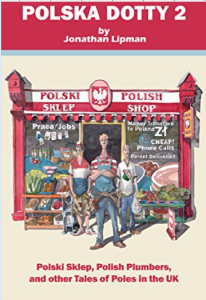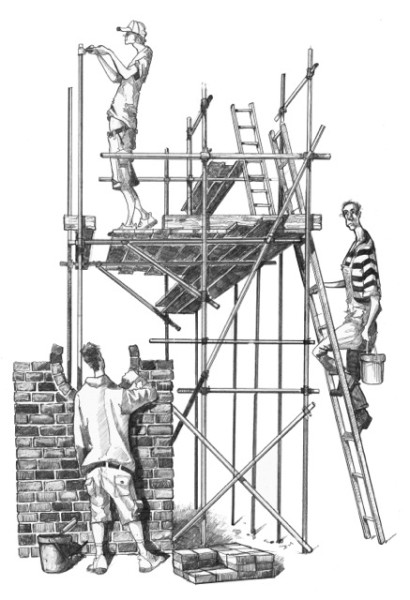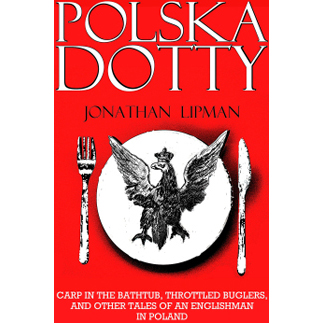 Polska Dotty 2
Polska Dotty 2
By Jonathan Lipman
The last time I encountered Jonathan Lipman, in his first book, Polska Dotty, I thought it would be fun to invite him for dinner because I was sure the conversation would be great. But with an ocean separating us, I put that out of mind. But it seems he did not put CR out of mind because what did I find in my mail this summer but a copy of Polska Dotty 2. Not quite a dinner invitation but it’s nice to be remembered.
The first Polska Dotty was about Lipman’s first encounter with the family of his future wife and the comedy of errors as everyone tripped over oddities in one another’s language and culture. Following a grand wedding in 1997, his work kept Jonathan and Marzena in Poland for another two years, during which time the English Mister Lipman sailed his little ship in the (mostly) smooth Polish sea. Of course, at that time, the Polish ship of state itself was navigating an uncharted course as well. Both of them navigated very well.
Polska Dotty 2 is set in London and oddly enough – given that he has been back home for years – I can’t help thinking that he has been transformed into Pan Lipman, a courtly Polish gentleman navigating a bigger ship, this time in an increasingly turbulent English sea. Not that the Polish sea has remained calm.
Lipman and his bride returned to London in 1999, five years before Poland joined the EU. At the time, Polish communities were few and scattered. Here and there one could find a Polski sklep, a Polish community centre, POSK, in Hammersmith, home to, among other things, a restaurant, café, and bookshop, and nearby a newspaper kiosk featuring a window with job notices, known as the sciana płaczu (wailing wall). There was also the old and elegant restaurant, Ognisko (The Polish Hearth), but more about that later.
And then things changed. With Poland in the EU, Poles arrived by the thousands, bringing with them an entrepreneurial spirit and a work ethic that quickly resulted in entire streets filled with skleps, fryzjers, and tradesmen of all sorts. Says Jonathan, an optimist and a ready friend, “Whilst I know the vast influx of Poles did not come here for our gratification, I have always felt good for Marzena that it happened.” To their delight, they found they could enjoy living in England and a bit of Poland all at the same time.
There is no question that the Poles contributed to the economic life of their neighbourhoods, says Jonathan, but they also put pressure on public services. They were willing to work harder, for less, driving down wages. Polish businesses were cutting into native businesses. But is that always true, or is it just an anti-immigration myth? And then, Polish kids were not only taking up too much space in schools but also achieving higher grades, especially in math. There is a limit to what a country can take!
On the other hand, Lipman does think Poles could try to integrate more. In some areas, they have established self-sustaining neighbourhoods: Polish shops, Polish doctors, Polish electricians, hairdressers, and yes, the famous Polish plumbers, all of them advertising in Polish.
And yet, after a few years, people who came for a short stay to make some money to take home, have decided to stay. Their children have integrated, and feel more at home here… than there. But like all immigrants at all times, that’s the normal pattern. The first generation needs their own language, their own people around them; the younger generation is the bridge.
 Still, economic inequality is a sore point, resentments abound, and someone must take the blame, enter the slimy Nigel Farage with a scapegoat. The rest we know.
Still, economic inequality is a sore point, resentments abound, and someone must take the blame, enter the slimy Nigel Farage with a scapegoat. The rest we know.
At the end of Lipman’s book, these issues are addressed, but despite the prejudice and even violence that started surfacing, Jonathan retains his optimism and faith in the goodness of most people. But the book ends before Brexit. (The obliging Jonathan Lipman sent CR an update. See next article.)
But Polska Dotty 2 is not all political. There is the hilarious story of home renovation with a cast of almost unbelievable Polish characters doing the work. Major hurdles are overcome: Polak potrafi. Nothing is on budget, nothing is on time. And yet, the work gets done and they all remain friends. Which I believe is a testament to Jonathan’s unflappable good nature… more than to the Polish plumber selected for the job.
The book ends with some Polish observations from members of the All-Girl Polish-Book Club about their new country. This is not only entertaining but also instructive. For a start, they all say that whatever the problems facing Polish immigrants in Britain right now, they could not imagine Poland taking in a comparable number of immigrants. The current government in Poland certainly reinforces this view, as it inflames public opinion against foreigners of every stripe.
On a lighter note, the Poles are mystified by the separate cold-and-hot taps to be found in British kitchens and bathrooms. They immediately update these with Polish taps, a decided improvement to British plumbing. And carpets in a bathroom? Out with those! Milk with tea, vinegar with chips (French fries), and… dare we say it? Terrible food.
However, they admire the Brits. For one thing, they love the “posh” language, though, in an aside, Jonathan points out that an extended stay will soon make them aware that Downton Abbey is not the norm. But there are other things. The British are happier, more tolerant, more engaged in volunteer work. And best of all, the British have the BBC News and other programming. Imagine! A first rate national network without government control.
The OGNISKO Restaurant – The Polish Hearth
Now for a small digression. The book mentions the very old and elegant restaurant, Ognisko, but says little about it. But once curiosity is aroused, what is one to do? One looks it up, and if one finds a fabulous review in the Financial Times, one shares it:
“The gourmand in me delights in Ognisko and my inner romantic is completely charmed. High on the walls of the bar are portraits of soldiers whose presence here, in exile, made the Polish Hearth Club a vital cultural nexus when it was founded in 1940. There’s something great about them sitting up there, not making any big deal about themselves, just looking down, clear-eyed, young, heroic, and watching us all have a thoroughly good evening.”
The reviewer does, of course, also write about the food, and describes it as at once delicious, exotic, and perhaps even dangerous!
“Ognisko’s ever so slightly retro charm really does make you wonder how it is that, over at the east end of town, hipsters are doing all this – the confiting, smoking, salting, curing, grilling and serving offal – as if they invented it last year, while these guys seem to have had it in their blood stream since prehistory”.
Here’s the full review by Tim Hayward, the romantic gourmand who must be utterly charming.
Don’t bother reading The Guardian’s review. Obviously written by an immature hipster, the type so smartly dismissed by the sophisticated Hayward.
CR
Images copyright and by permission, Liam O’Farrell



